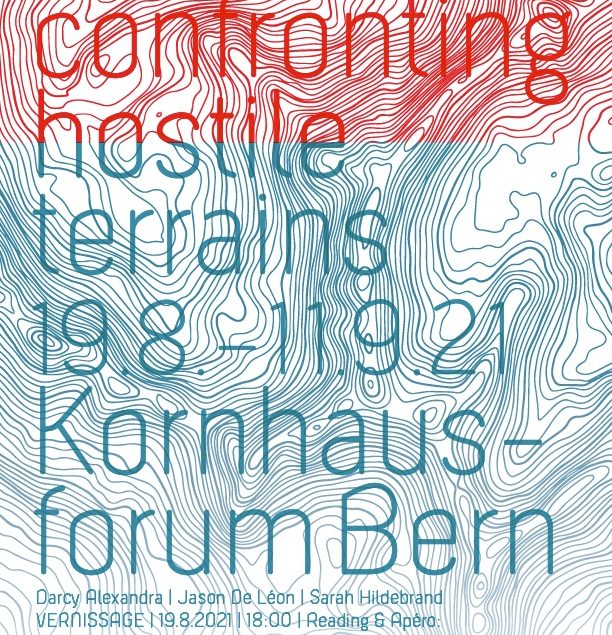Confronting Hostile Terrains, 19.08.2021 – 11.09.2021 Kornhausforum, Bern
The exhibition Confronting Hostile Terrains is a tribute to people who have lost their lives attempting to cross international frontiers and to those who have lost years of their livelihoods languishing in detention and asylum centers. The exhibition constitutes a critique of contemporary migration and border policies that systematically exclude some people from economic, socio-cultural, and political participation. With four interventions, Confronting Hostile Terrains explores urgent questions of remembrance and responsibility and joins the call for a dignified life for all – regardless of legal status.
Hostile Terrain 94 is a participatory exhibit created by the Undocumented Migration Project. The exhibit is composed of approximately 3,600 handwritten toe tags that represent migrants who have died trying to cross the Sonoran Desert from the mid-1990s to 2020. These tags are geolocated on a wall map of the Arizona—Mexico border, showing the exact locations where human remains were found. The physical act of writing out the names and information for the dead invites participants to reflect, witness and stand in solidarity with those who have lost their lives in search of a better one. HT94 is taking place at over 120 institutions across 6 continents with the intention to raise awareness about the humanitarian crisis and to engage with communities around the world in conversations about migration.
The Living in Direct Provision series is comprised of photo films co-created with research collaborators over a production period of six months. During participatory seminars, collaborators developed the images, wrote the scripts, and edited their videos within a community of practice facilitated by visual anthropologist Darcy Alexandra. From the foundation of their audiovisual production, participants analyzed migration policy and revealed their everyday experiences in the Irish asylum system. The Living in Direct Provision series premiered at the Irish Film Institute (IFI) in Dublin and has screened internationally at festivals and conferences.
Water is an artistic reportage, using photography and text. Water follows the traces of people who cross physical, emotional, geographical borders and boundaries in search for a better life. The project is the result of a long-term collaboration with the social anthropologist Gerhild Perl, University of Bern, and artist Sarah Hildebrand and features as the last chapter of the book hope (2018).
We are the People of the Sea is the artistic continuation of Water developed by Sarah Hildebrand. Printed on silk and text, it is an homage, a tribute, a prayer to people who have disappeared in the sea.

